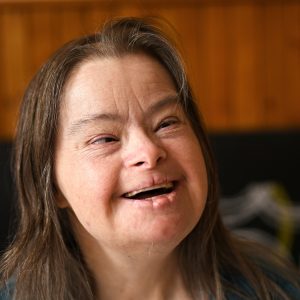 Research confirms that by the age of 40, almost 100% of persons with Down syndrome who die have changes in the brain associated with Alzheimer’s disease (AD). Understanding this link and the challenges of a diagnosis of AD in persons with Down syndrome is important for families and healthcare professionals.
Research confirms that by the age of 40, almost 100% of persons with Down syndrome who die have changes in the brain associated with Alzheimer’s disease (AD). Understanding this link and the challenges of a diagnosis of AD in persons with Down syndrome is important for families and healthcare professionals.
Down Syndrome occurs when a person has three copies of the 21st chromosome instead of the normal two copies. Studies show that one of the main genes responsible for AD is on the 21st chromosome and is more active in persons with Down syndrome. Because of this extra copy of the Alzheimer gene, virtually 100% of people with Down syndrome will develop the plaques and tangles in the brain associated with AD, but not necessarily the same memory loss. Although research is not complete, it is estimated that about 50% of persons with Down syndrome will develop the characteristic memory problems of AD before age 50.
Testing for AD in persons with Down syndrome is often challenging. Diagnosis of AD is difficult for a number of reasons:
- Persons with Down syndrome are susceptible to hypothyroidism and depression, which are both reversible conditions but often go untreated and can be mistaken for AD.
- Side effects of medications taken for either of these conditions can also mimic AD.
- Normal AD skills testing are often not applicable for persons with Down syndrome simply because of learning differences.
- Communication skills of persons with Downs syndrome may affect the results of assessment testing.
Families need to watch for signs of AD, especially as their loved one reaches middle age years. Diagnosis is important, but also education, resources, and support are especially critical for care partners. Learning to better respond to surprising new behaviors will prepare families for AD symptoms, such as changes in judgment, processing speed, memory recall, to name a few.
Care partners, either family or professionals, need to have access to new communication tools, understand that care processes will need to be adjusted as well as home or residential changes to their living environment. Staff and family training will help care partners better serve their residents and loved ones.
Person-centered care approaches to help persons with Down’s syndrome who have developed AD is key to maintaining a loving, trusting environment, where they feel loved, valued and are treated as individuals.
Pam Brandon is President and Founder of AGE-u-cate® Training Institute and a passionate advocate for culture change, improving the quality of life of aging adults, and transformative training for professional and family care partners. She is the creator of the internationally recognized Dementia Live® simulation experience and collaborated with expert Ann Catlin on the transformational Compassionate Touch® training.
References:
 Delirium is an acute disorder of attention and global cognition, including perception and memory, and is treatable. Learning the differences between delirium and dementia is important for professional and family caregivers, as the diagnosis is missed in more than 50% of the cases.
Delirium is an acute disorder of attention and global cognition, including perception and memory, and is treatable. Learning the differences between delirium and dementia is important for professional and family caregivers, as the diagnosis is missed in more than 50% of the cases. We are honored to be a part of the National Pioneer Network Conference kicking off today in beautiful Denver, Colorado. Ushering in a New Culture of Change promises to be an enlightening and invigorating educational and networking event for participants and those serving the elder care industry.
We are honored to be a part of the National Pioneer Network Conference kicking off today in beautiful Denver, Colorado. Ushering in a New Culture of Change promises to be an enlightening and invigorating educational and networking event for participants and those serving the elder care industry.  No longer is dementia a looming public health threat. It is a global crisis affecting healthcare systems, delivery of long-term care, worker shortages, community infrastructure, families and most importantly, the quality of life for persons living with dementia.
No longer is dementia a looming public health threat. It is a global crisis affecting healthcare systems, delivery of long-term care, worker shortages, community infrastructure, families and most importantly, the quality of life for persons living with dementia.